Can You Play Pickleball in the Rain? A Comprehensive Guide
Pickleball has soared in popularity over recent years, capturing the hearts of people young and old with its blend of strategy, speed, and accessibility. But can you play pickleball in the rain? For outdoor pickleball enthusiasts, this can be a challenging question. In this comprehensive guide, we delve into whether it’s feasible, safe, and enjoyable to play pickleball in the rain.
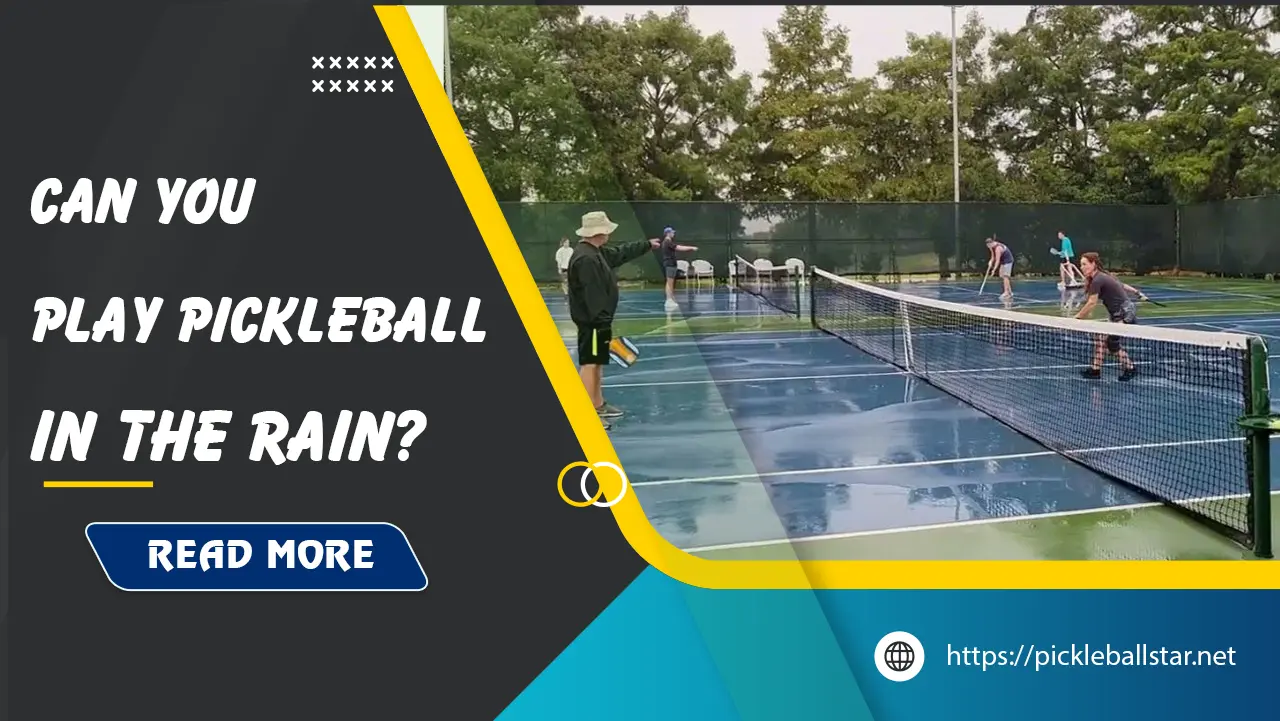
Introduction
Pickleball is much like a chameleon, adaptable to various environments and seasons, which makes it an excellent year-round sport. Unlike some sports that come with strict seasonal affiliations, pickleball courts are bustling with activity whether it’s sunny or overcast. However, rain poses a unique challenge. Here, we explore different perspectives on the impact of rain on pickleball play, from safety concerns to the condition of the equipment.
What makes pickleball a popular sport for playing year-round?
Pickleball’s versatility is one of its standout features. Unlike sports such as skiing, which are dependent on specific weather conditions, pickleball can adapt to a wide range of environments. Outdoor courts are ever-popular during spring and summer, and indoor facilities pick up the slack during rain or winter.
- Accessibility: Pickleball courts are readily available in many parks, recreational centers, and clubs, making it easy for players to find a place to play year-round.
- Ease of learning: Given its simple rules and easy-to-learn nature, pickleball attracts players across a broad age spectrum.
- Community: The sport fosters a strong sense of community. Whether in leagues, clubs, or spontaneous meetups, the game promotes social interaction which enhances its year-round appeal.
Are there any other outdoor sports that are significantly affected by rain?
Rain affects a variety of outdoor sports with varying degrees of severity.
- Tennis: Much like pickleball, the surface becomes slippery, and the balls absorb moisture, altering game dynamics.
- Golf: While play continues in light rain, heavy rain can flood courses, leading to cancellations.
- Soccer: The game can proceed in the rain, but muddy fields increase the risk of injuries.
- Running: Popular especially for marathons, rain can make surfaces slippery and dangerous for athletes.
Why is player safety a top priority when playing sports in wet conditions?
Safety becomes paramount because wet conditions introduce multiple hazards. Slippery surfaces drastically increase the risk of slips and falls. Moreover, wet equipment can lead to compromised performance and further safety issues. Therefore, being vigilant about safety can prevent numerous injuries, ensuring that the sport remains enjoyable and sustainable.
Court Surface and Rain
The type of court where you play pickleball can dramatically change the experience, especially under wet conditions. Different surfaces interact differently with water, influencing both safety and playability.
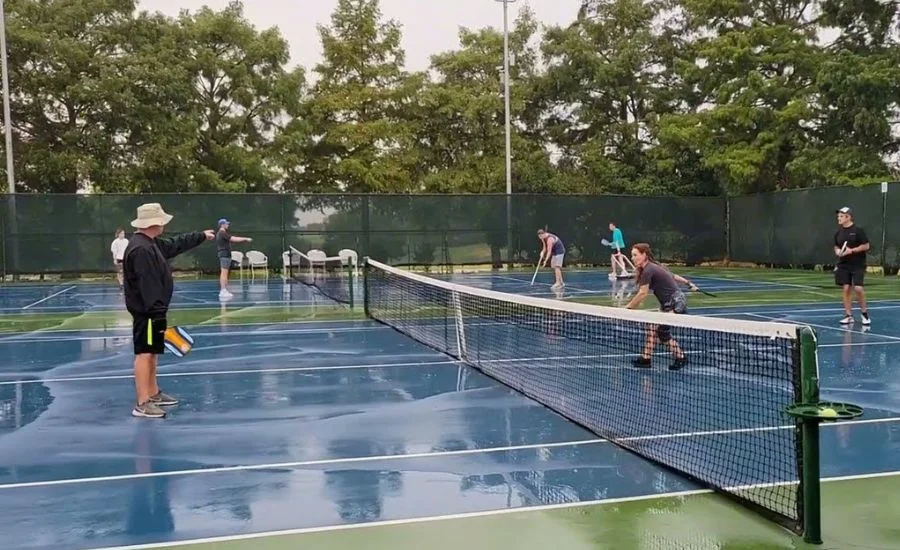
What are the best and worst types of court surfaces for playing pickleball in the rain?
Court surfaces play a pivotal role in how rain affects the game. Here’s a look at some common surfaces and their interaction with rain:
- Composite Materials: These surfaces are relatively slip-resistant and drain water quickly, making them one of the best choices.
- Asphalt: While durable, asphalt can become extremely slippery when wet, posing a significant risk to players.
- Concrete: Concrete surfaces can range from fair to poor for wet play. They often become slick and dangerous.
- Grass: Although soft, grass courts can become muddy and uneven, making them unsuitable for rain.
| Court Surface | Rain Resistance | Safety Level |
|---|---|---|
| Composite Materials | High | High |
| Asphalt | Low | Low |
| Concrete | Medium | Medium to Low |
| Grass | Low | Low |
How can you determine if a pickleball court is safe to play on after rain?
Assessing a court’s safety post-rain involves a few essential steps:
- Visual Inspection: Look for standing water or puddles. A court should be as dry as possible to minimize slipping.
- Testing the Grip: Walking around the court and testing the grip with your shoes can help determine slipperiness.
- Surface Feel: Touching the surface to check for any slickness will also give you an idea about its playability.
Are there any specific cleaning or maintenance tips for pickleball courts after rain?
Post-rain maintenance is crucial for safety and longevity of the backyard Pickleball court:
- Use of Squeegees: Tools like squeegees can help remove excess water quickly.
- Blowers: High-powered blowers can accelerate the drying process, especially for composite and asphalt surfaces.
- Regular Cleaning: Regular cleaning prevents debris build-up, which can worsen when wet.
Equipment
Playing pickleball in the rain doesn’t only challenge the court surface but also your equipment. Understanding how rain affects your pickleball equipment can help you adapt and mitigate issues.
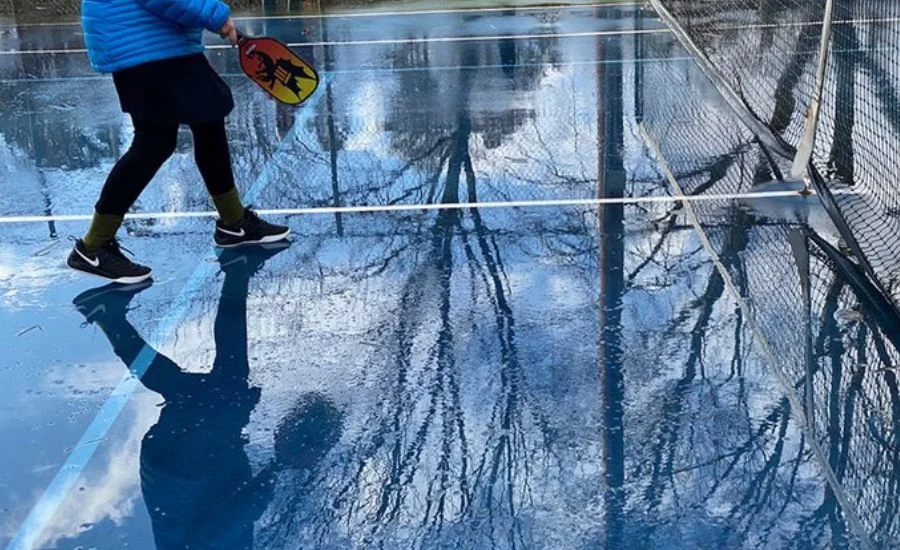
What happens to pickleball balls when they get wet?
Pickleball balls are made of plastic, and though somewhat resilient, rain can profoundly affect them:
- Weight Increase: Balls can absorb water, making them heavier and impacting flight.
- Bounce Reduction: Heavier balls tend to have less bounce, altering the game dynamics.
- Durability: Continuous exposure to wet conditions can degrade the material, reducing ball life.
How does a wet paddle affect a player’s grip and control?
The paddle is an extension of the player’s hand, and its condition directly affects performance:
- Grip Issues: Wet handles can become slippery, making it hard to maintain a firm grip.
- Control Reduction: Slippery paddles lead to less control over shots, impacting precision.
- Potential Injuries: Lack of control may result in accidental paddle drops or mis-hits, leading to potential injuries.
Are there any special pickleball balls or paddles designed for playing in wet conditions?
Innovations in equipment can help mitigate some of the challenges brought on by rain:
- Rain-Resistant Balls: Some manufacturers produce balls designed to resist water absorption, maintaining their weight and bounce better.
- Advanced Grip Paddles: Paddles with textured or rubberized grips can offer improved handling in wet conditions.
- Hydrophobic Materials: High-end paddles feature hydrophobic materials that repel water, keeping the handles dry.
Player Safety
Safety on the court is paramount, and wet conditions introduce numerous risks that players must be mindful of.
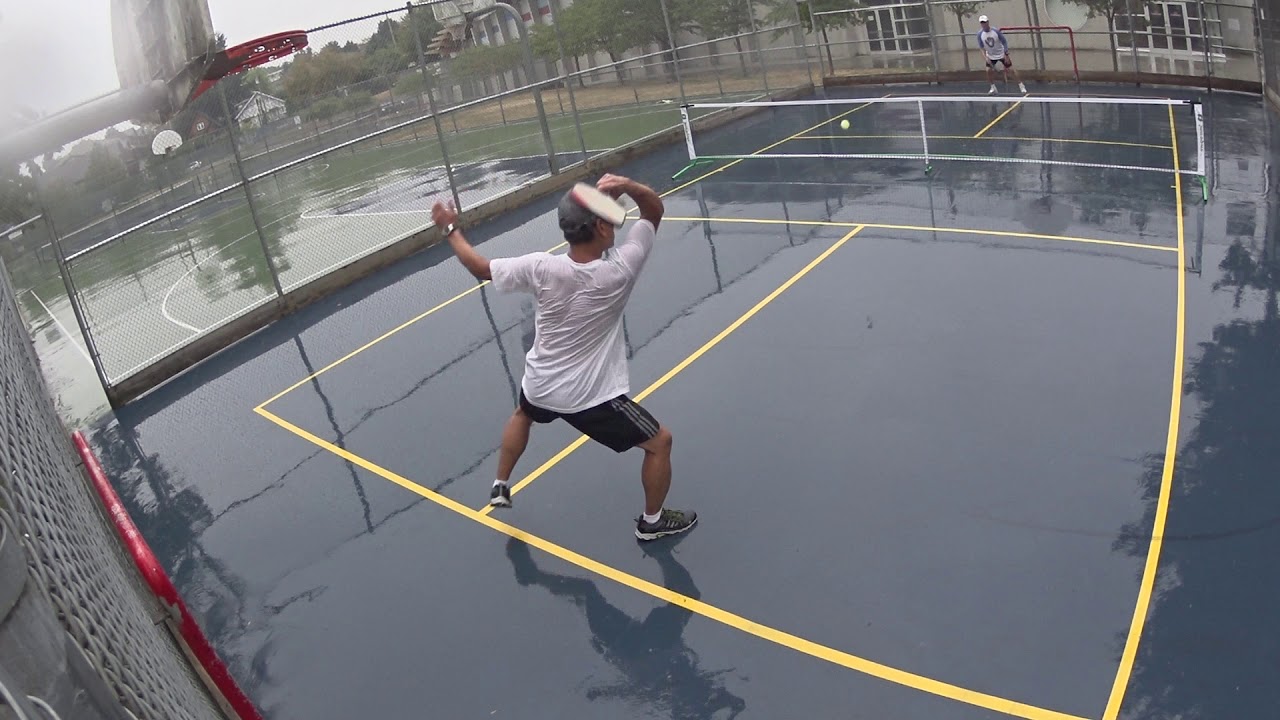
What are some of the specific risks to player safety when playing pickleball in the rain?
Rain significantly alters the game environment, introducing several risks:
- Slipping: Wet surfaces are slippery, increasing the risk of falls and injuries.
- Visibility: Rain and overcast conditions can reduce visibility, making it hard to track the ball and other players.
- Grip Issues: As discussed, wet paddles can slip from hands, causing accidents.
- Hypothermia: Prolonged exposure to rain without proper gear can lead to hypothermia, especially in cooler temperatures.
How can players reduce the risk of falls and injuries on a wet court?
Players can take various steps to play safer in the rain:
- Proper Footwear: Shoes designed with extra grip can help prevent slips on wet courts.
- Warm-Ups: Ensuring muscles are well-warmed can reduce strain injuries.
- Reducing Speed: Playing at a slightly slower pace can help maintain control and reduce the risk of falls.
What are some essential safety tips for players playing pickleball in the rain?
Here are some key safety tips:
- Wear Appropriate Gear: Waterproof clothing, proper shoes, and sometimes even gloves for better grip.
- Monitor Weather Conditions: Pay attention to worsening conditions and know when to stop.
- Hydrate and Stay Warm: Keep hydrated and ensure you’re dressed warmly to counteract the cold rain.
- Communicate: Ensure clear communication with your playing partners to avoid collisions and mishaps.
Alternatives to Playing in the Rain
What to do if it’s pouring cats and dogs but you’re itching for some pickleball action? There are several enjoyable and productive alternatives.
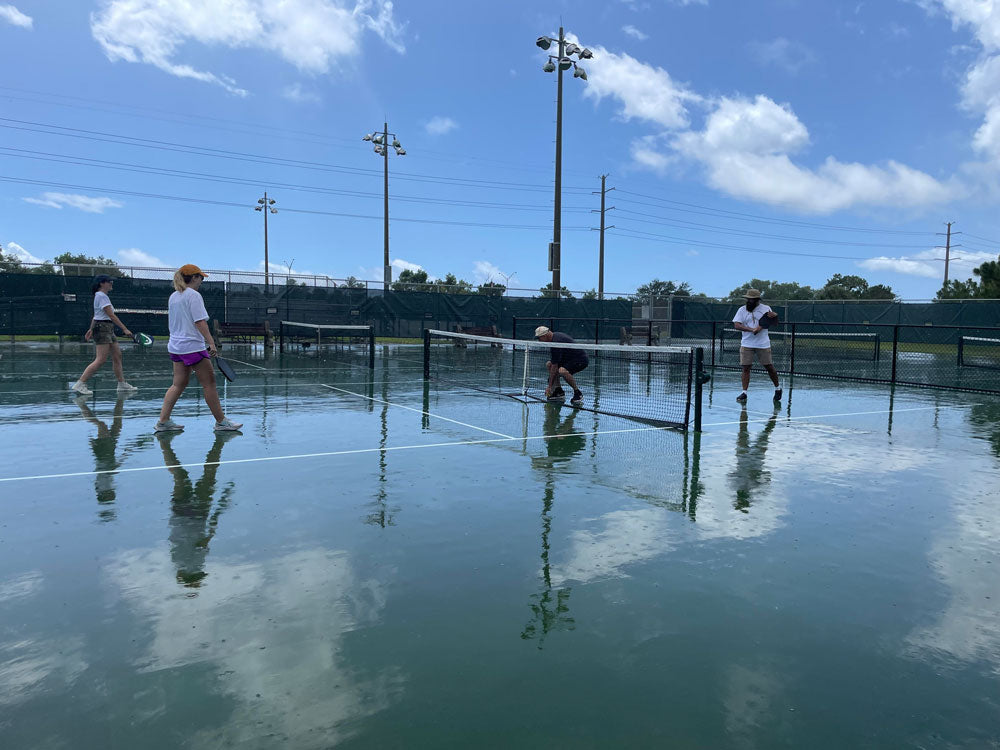
What are some other indoor or outdoor activities that pickleball players can do when it’s raining?
Rain shouldn’t dampen your spirits or your plans for physical activity:
- Gym Workouts: Focus on strength training and cardiovascular exercises.
- Swimming: Indoor pools are great for full-body workouts.
- Yoga: Improves flexibility, strength, and mental focus, which can benefit your pickleball game.
Are there any pickleball clubs or organizations that offer indoor pickleball play during rainy weather?
Yes, many clubs and recreational centers offer indoor pickleball facilities. These typically provide:
- Scheduled Sessions: Clubs often have specific times set aside for pickleball.
- Membership Benefits: Being part of a club might offer you access to multiple facilities.
- Events and Tournaments: Some clubs organize indoor tournaments regardless of weather conditions outdoors.
Could rain be a good opportunity for pickleball players to work on their skills and technique?
Rainy days can be the perfect time to focus on:
- Theory and Strategy: Studying game tactics and match videos.
- Skill Drills: Indoor drills that don’t require a full court can improve hand-eye coordination.
- Mental Training: Visualization and mindfulness exercises can sharpen focus.
Frequently Asked Questions
Can you play pickleball in a light drizzle?
Playing pickleball in a light drizzle is often feasible:
- Less water Accumulation: Light drizzles don’t saturate surfaces quickly.
- Preparation: Proper gear and caution can mitigate risks.
- Shorter Sessions: Playing shorter sessions can reduce risk while still keeping the game fun.
Are there any specific weather conditions that make it unsafe to play pickleball outdoors?
Certain conditions are a clear red flag:
- Heavy Rain: Causes puddles and extremely slippery surfaces.
- Thunderstorms: Playing during thunderstorms is hazardous and should be avoided due to the risk of lightning.
- Strong Winds: Can affect ball control and introduce debris, making play dangerous.
What are some of the most common mistakes players make when playing pickleball in the rain?
Avoid these pitfalls:
- Ignoring Safety: Disregarding the importance of proper shoes and gear.
- Underestimating Conditions: Playing in heavy rain or high wind without recognizing the risks.
- Overconfidence: Trying to play as aggressively as in dry conditions can lead to accidents.
How does the rain affect the pace and rhythm of the game?
Rain tends to:
- Slow Down Play: Players may move more cautiously, slowing the pace.
- Affect Ball Control: Heavier, wet balls can make precise shots more challenging.
- Disrupt Concentration: Constant awareness of wet surfaces and changing grip conditions can break the rhythm.
Conclusion
What are the most important things to consider when deciding whether to play pickleball in the rain?
When deciding to play in the rain, consider safety above all:
- Court and Equipment Condition: Thoroughly inspect the court and your equipment.
- Weather Severity: Light rain can be manageable; heavy rain, thunderstorms, and strong winds are not.
- Personal Readiness: Ensure you are dressed appropriately and are in good health to handle the additional physical stress.
Is it ever acceptable to play pickleball outdoors when it’s raining?
Yes, with precautions:
- Preparation and Caution: Ensuring proper gear and a cautious approach.
- Assessment of Conditions: Recognizing when it’s safe and when it’s not, based on the severity of the rain and court conditions.
How can the pickleball community promote safe and enjoyable gameplay during various weather conditions?
Community efforts can bring significant improvements:
- Facility Innovations: More indoor courts and rain-resistant features on outdoor courts.
- Education: Programs and workshops on playing safely in different weather conditions.
- Events and Communication: Regular updates on weather conditions and scheduled indoor sessions during rainy periods.
In the world of pickleball, rain does bring challenges, but it also opens up opportunities for camaraderie, innovation, and renewed appreciation of the sport. Whether you choose to embrace the rain or seek alternatives, understanding and adapting to these conditions ensures the game remains both safe and enjoyable.
